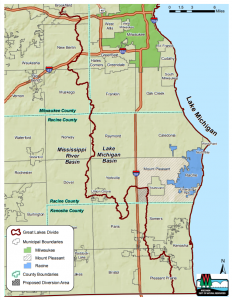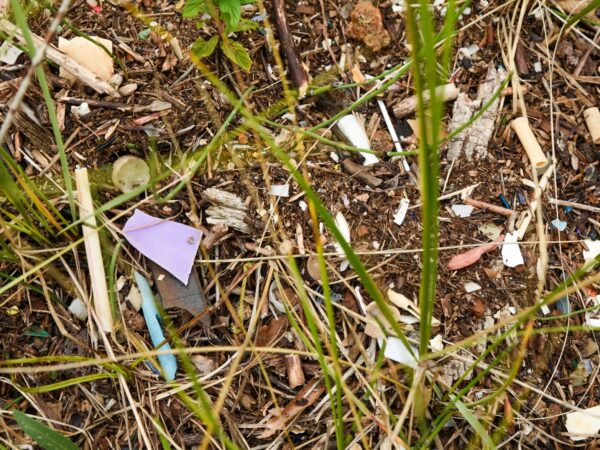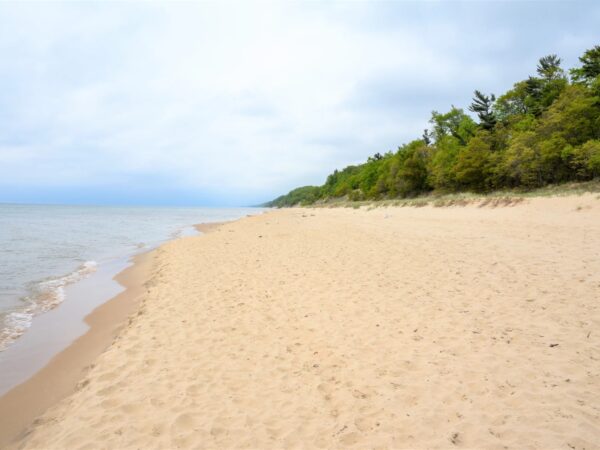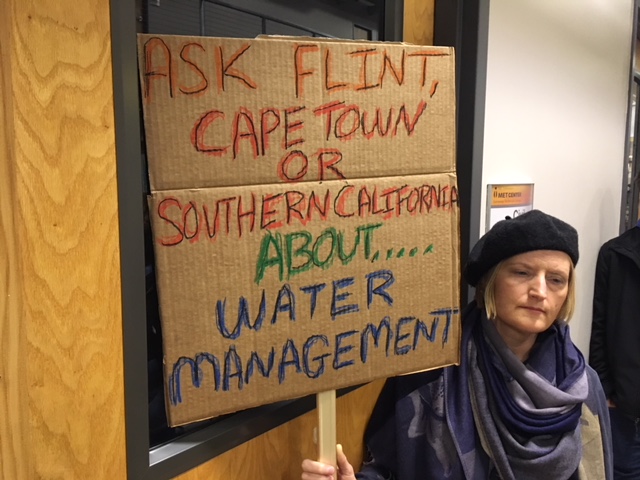
Post-Waukesha respite short-lived
The impasse in the fight over who’s entitled to take Great Lakes water in Southeast Wisconsin didn’t last long.
Waukesha recently won a decade-long tussle over whether Waukesha has the right to tap Lake Michigan water. Common wisdom said the water wars had ended, at least for a while.
But that didn’t happen.
The fight has resumed with intensity as illustrated by overflow attendance at a public comment session last week conducted by the Wisconsin DNR on the city of Racine’s Foxconn diversion request.

Full house at Racine-Foxconn diversion public comment session, courtesy of Gary Wilson
Approximately 300 people jammed the SC Johnson Center near the proposed site to speak on the issue.
Racine is in the Great Lakes basin but has been selected to supply water to support the needs of international tech manufacturing giant Foxconn’s proposed production facility. The plant will be located in a town that straddles the Great Lakes basin divide so it’s not automatically allowed to take Lake Michigan water.
Racine is requesting approximately seven million gallons of water per day.
Unlike Waukesha’s request, which needed approval from all eight Great Lakes states, the Racine-Foxconn diversion only needs Wisconsin’s approval.
Peter Johnson, representing the Great Lakes-St. Lawrence Governors & Premiers, told Great Lakes Now that in a previous straddling community diversion in New Berlin, Wisconsin, the DNR may have offered the other states the opportunity to comment as a courtesy.
“But it wasn’t required under the Compact,” Johnson said. The governors and premiers are the secretariat of the Compact.
“Fudging Compact criteria”
Racine Mayor Cory Mason and the city’s head of the water department started the comment session requesting approval of the diversion. As a state legislator, Mason opposed the Waukesha diversion.
Then came a number of anti-diversion comments

Environmental attorney Jodi Habush Sinykin comments on the Racine-Foxconn diversion request, courtesy of Gary Wilson
Attorney Jodi Habush Sinykin said if the proposal is approved, the DNR would be “fudging Compact criteria” because the Great Lakes Compact stipulates that diverted water be used primarily for “public water supply purposes.”
Habush Sinykin is with Midwest Environmental Advocates.
Foxconn would be the primary user of the Lake Michigan water in this request. The Compact also states that the water can also be used for commercial purposes.
“If a key definition’s plain meaning is allowed to slide, it sets a harmful precedent at a time when the Compact is still new and being tested,” according to Habush Sinykin.
She said the Compact’s “integrity is on the line” with this decision.
Natural Resources Defense Council attorney Karen Hobbs echoed the concern about deviating from the requirement that diverted water be used for public water supply purposes.
She also pushed back on a conservation issue.
Hobbs noted that the Racine diversion application lacked “specific conservation and efficiency measures” as required by the Compact. Their absence means “the application is incomplete and should not be approved,” according to Hobbs testimony.
“Massive economic development”
Business interests see the Foxconn diversion as an opportunity to serve two masters; compliance with the terms of the Compact and economic development.
Lucas Vebber, an attorney with Wisconsin Manufacturers & Commerce, said in his written comments to the DNR that “the application before you today is to allow exactly what was intended when the Compact was first adopted.”
He went step-by-step through provisions of the Compact to support his position, including a statement that the request is “clearly within the public use parameters” of the agreement.
Vebber’s support for the diversion request includes a statistical analysis of the amount of water to be drawn which he pegged at “two-billionth of one percent” of the total Lake Michigan volume.
Approval of the request would be a “vital step toward massive economic development” in Wisconsin. “The project will create thousands of high-skilled, family-supporting long term jobs,” according to Vebber’s statement.
Mayors group on the fence
Comments by a representative of the Great Lakes & St. Lawrence Cities Initiative straddled both sides of the debate.
Program Manager Melissa Soline’s statement stressed compliance with the Compact and recognized the importance of economic development in the region, but did not recommend either approval or denial of the request.
The Cities Initiative represents the interests of 130 U.S. and Canadian mayors on environmental and economic issues in the Great Lakes region.
The Initiative was particularly active in opposing the Waukesha diversion and came within an eyelash of filing a lawsuit to prevent its approval before backing down at the last minute.
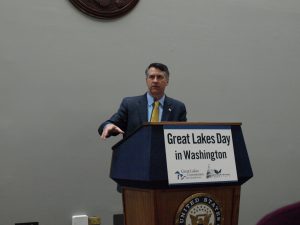
Former Racine Mayor John Dickert at the Great lakes Day Congressional Breakfast, courtesy of HOW Coalition
Ironically, John Dickert was the mayor of Racine for most of the period when the Initiative was opposing the Waukesha diversion. Dickert resigned his position last year to lead the Cities Initiative.
Racine is a member of the Cities Initiative.
Other comments focused on the quality of the wastewater to be returned to Lake Michigan after the manufacturing process is complete.
A fact sheet on Racine’s website says details on the quality of the wastewater are not now available, but that’s not a requirement of the application process. The sheet says “Foxconn will be treated the same as any other industrial wastewater user.”
“There are no exemptions to any local, state or federal environmental requirements related to wastewater discharges,” according to the fact sheet.
In addition to the public comments, the Wisconsin DNR is accepting written comments until March 21st. The agency is targeting a late April decision on the request.
Details on the diversion application are on the DNR’s Racine Diversion website.
Editor’s Note: DPTV’s Great Lakes Bureau’s documentary on water withdrawal will be shown on DPTV on March 26th, 2018 at 7:30pm ET on Detroit Public Television. Check your local listing for the correct time.
2 Comments
-
John Dickert became head of the Great Lakes Cities
Initiative, and the collective group of mayors representing cities around the
Great Lakes mayors without explanation dropped their lawsuit against the Waukesha (Wisconsin’s County for the Republican stronghold) decision. Then came the Foxxconn announcement to locate in his community, despite his strong argument against Waukesha’s return flow to Racine’s harbor that has since went silent.The Great Lakes will die a death by a thousand straws because the compact is dead. There is no legal defense fund mechanism and no single state will use their taxpayer dollars to defend it.
-
Water wars: Next phase of conflicts around the globe. Lets all brace up.


